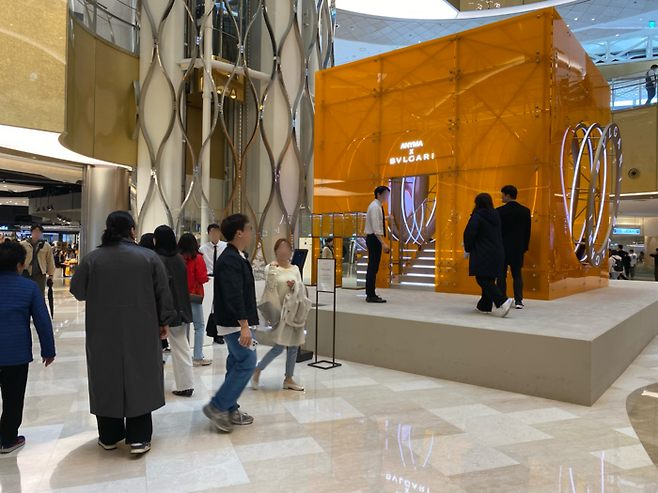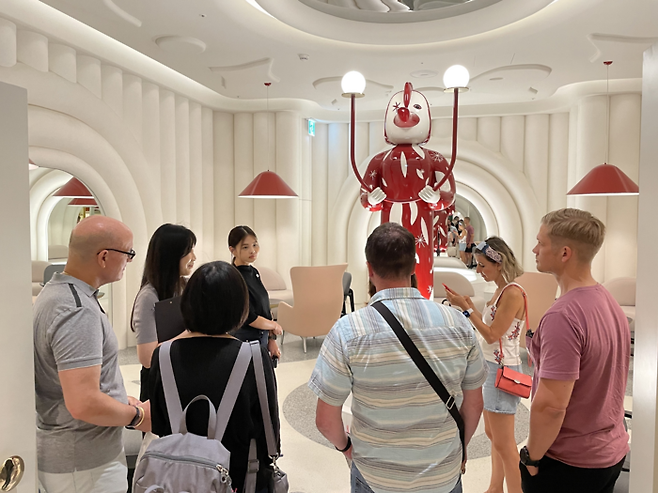Department store luxury goods sales tripled thanks to Kpop stars
Foreign tourists flocked to the Lotte Department Store main branch in Sogong-dong, Jung-gu, Seoul on the afternoon of the 22nd. Customers from various countries, including Japan, China, and Russia, formed groups with their partners, family, and friends to explore luxury boutiques on the 1st and 2nd floors. Mr. Davis, an American who visited Gucci and Balenciaga stores, remarked, “Korean department stores bring in new products quickly, and the staff is perceived as friendly.” He added, “Their accessibility, being close to the subway stations, is also a strong point.”

The purchase of luxury goods by foreign visitors at Korean department stores has more than tripled this year. According to the three major department stores, Lotte, Shinsegae, and Hyundai, the luxury goods purchases by foreign customers have increased by more than three times compared to the same period last year until February. Considering that the growth rate of luxury goods sales, including domestic and foreign customers, was in the 10% range during the same period, the growth rate of foreign sales stands out. In particular, both Shinsegae and Hyundai Department Stores have recorded all-time highs in both overall luxury goods sales and foreign luxury goods sales in the first two months of this year.
The reason for the increasing trend of foreign tourists shopping for luxury goods at Korean department stores is that Korea has emerged as an important market among overseas luxury brands. According to Morgan Stanley, a U.S. investment bank, South Koreans recorded the highest per capita luxury goods consumption in the world in 2022, at $325, surpassing the United States ($280) and Japan ($210). Luxury brands prioritize launching new products in Korea as part of their enhanced strategies to capture the Korean market. A Shinsegae official stated, “As the importance of the Korean market in the Asian luxury market grows, many diverse products are introduced. There are also items that are first introduced or exclusively unveiled in Korea.”

Pop-up stores operated by major department stores also attract both domestic and foreign luxury customers. It has been reported that 30% of luxury sales generated at Shinsegae Gangnam’s The Stage and Lotte Department Store’s AvenueL Jamsil’s The Crown come from new customer sales.
The increasing number of Korean idols and actors serving as ambassadors for luxury brands also positively influences luxury goods sales at Korean department stores. Many customers associate certain luxury brands with Korean stars such as Blackpink’s Jennie, G-Dragon, Kim Go-eun, and NewJeans‘ Danielle. As a result, luxury goods purchased in Korea are considered highly trustworthy. With the increasing sophistication of Chinese counterfeit luxury goods, the image of luxury goods purchased in Korea being reliable has become stronger.

The nationalities of foreign customers purchasing luxury goods at Korean department stores are becoming increasingly diverse. Last month, the nationalities of foreign customers visiting the luxury section of Galleria in Apgujeong, Seoul were mostly from China, Thailand, and the United States, in that order. The weakening of the Korean won against the U.S. dollar is also cited as one of the reasons why foreigners buy luxury goods in Korea. The exchange rate has dropped from 1,135 won per dollar in March 2019 before the outbreak of the pandemic to 1,344 won recently, a decrease of 18%. If the prices of products are set equally in the global luxury market, purchasing in Korea can be relatively advantageous.
The growth of the Korean luxury goods market is evidence of the accelerating polarization in the consumer market. While low-priced items are selling well at discount stores such as Ali and Temu, as well as Daiso, luxury goods are steadily performing well. According to the Ministry of Industry, Trade and Resources, sales of imported cosmetics, clothing, and accessories from famous foreign brands recorded a growth rate of 6.6% in January, while overall offline retail sales in Korea declined. Kwon Jung-yoon, a research fellow at Trend Korea’s Consumer Trend Analysis Center, explained, “The fact that luxury goods sell well despite the economic downturn is a representative example of consumer polarization,” adding, “There is a psychological aspect of wanting to confirm that one can still consume premium products even in an economic downturn.”












